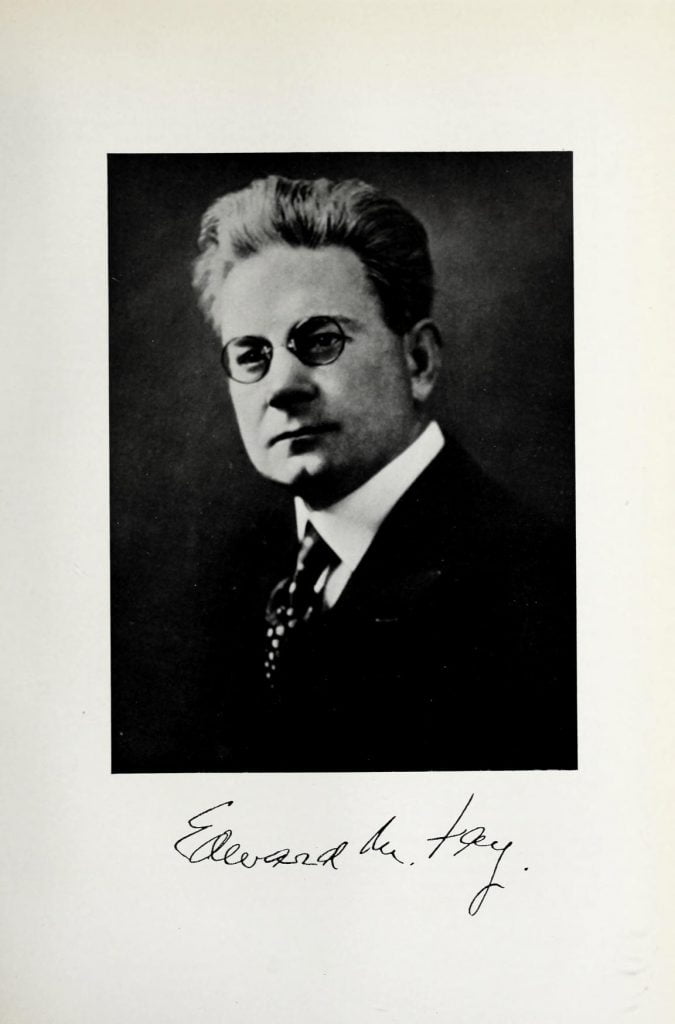No man is better known in a community than the man who amuses its residents through the medium of first-class recreational opportunities such as are furnished by the theatre, the motion picture house, music, and the dance. When his standards are high and his ideals those of the most discriminating people in the city, his success is assured, and his leadership in matters of taste and intellectual progress generally recognized. This introduction may properly be used for Edward M. Fay, of Providence, Rhode Island, who operates the Fays, Carlton, Majestic, Rialto, Modern and Capitol theatres in that city, and who has a distinguished record for musical achievement. Testimony to his popularity is his place on the board of directors of the Providence Chamber of Commerce and of the American Red Cross.
The origin of the name “Fay” is interesting, since the days when the Normans used it to describe plantations of beech and spelled it “Faye” or “Fayel.” It first appeared as a patronymic in 1173, when it was spelled Foy. A branch of the family came in early Colonial days from England to this country, where one Henry Fay, a weaver, settled in Newbury, Massachusetts, where he died in 1655. Another Englishman, John Fay, born in England in 1648, came at the tender age of eight to this country and lived in the towns of Watertown, Sudbury, and Marlboro, Massachusetts. The branch to which Edward M. Fay belongs, however, came from Ireland, whence his grandfather, Michael Fay, emigrated. In the new country he proved himself a hero, who volunteered for service under the Union flag in the Civil War, and who died defending it. His name appears on the monument in front of City Hall, Providence. Michael Fay’s son was James M. Fay, who died from a lingering disease contracted during the Civil War.
Edward M. Fay, son of James M. Fay, was born in Providence in 1875. He was educated for the career of a violin soloist, studying with Jules Eichberg, founder of the Boston Conservatory of Music; and he studied in the public schools of Providence and East Providence. He was known as a boy wonder between the ages of eight and fifteen, when he traveled about New England playing violin solos and obligatos for such great singers as Emma Calve and others. Edward M. Fay played violin solos for the Providence Symphony Orchestra under the direction of Robert Bonner, famous musician forty years ago in Providence. His father died when he was fifteen, and Mr. Fay commercialized his art, traveling on the road with the Bostonian Opera Company. He played over the Keith Circuit as a violin soloist and meantime studied dancing and dance music under the tutelage of Sam Spink, conductor of the famous Spink Dancing Academy and a very fine musician. Mr. Fay took the leadership of the Keith Theatre in Providence the year Charles Lovenberg was made manager and led the orchestra at Keith’s when vaudeville was first introduced to Providence. He created and established the custom of dancing at Rhodes-on-the-Pawtuxet, where he spent seventeen years, and he afterward built and operated Hunt’s Mills Dancing Pavilion. These varied occupations did not prevent Mr. Fay’s organizing an orchestra which became famous as the Belmont Orchestra, and later Fay’s Belmont Orchestra. His organization and direction of Fay’s Second Regiment Band brought him the appointment of lieutenant by Governor Utter. At the death of D. W. Reeves, this versatile musician took over the Reeves American Band, which he directed for several years. He organized the Electric Park Amusement Company, in Newark, New Jersey, which he operated as general manager and treasurer for several years, during which he became known as “Fay, the dance king.” He directed orchestras and played for all the important social events in Providence, Newport, Boston, and other cities.
It was in 19×6 that Mr. Fay became a theatre manager. He took over the former Union Theatre and operated it under the new title of Fay’s Theatre. Under his management the National Theatre, in Rochester, New York, began a new lease of life in 1918 under the name of Fay’s Theatre. In 1919, Mr. Fay bought the Knickerbocker Theatre in Philadelphia and gave it his name, and in 1921, acquired the McKinley Square Theatre in New York City, to which he gave his name. It was in 1926 that he acquired the Emery, now known as the Carlton Theatre, and the Majestic, Rialto, Modern, and Capitol, all purchased from the Emery Brothers. For many years he was a member of the board of directors of the Motion Picture Theatre Owners of America. He is now a member of the board of directors of the Providence Chamber of Commerce, a member of the Rochester Chamber of Commerce, and several clubs, including the Rhode Island Auto Club, the Catholic Club of Providence, the Town Criers, and the Friars and Motion Picture clubs of New York. His lodge is No. 14, Benevolent and Protective Order of Elks. In religious faith he is a Catholic.
At Providence, February 12, 1913, Edward M. Fay married Katherine A. Lahiff, daughter of Thomas H. and Mary Lahiff. Mr. and Mrs. Fay reside on President Avenue.
Source: Carroll, Charles. Rhode Island: Three Centuries of Democracy, vol 3 of 4. New York: Lewis historical Pub. Co., 1932.

